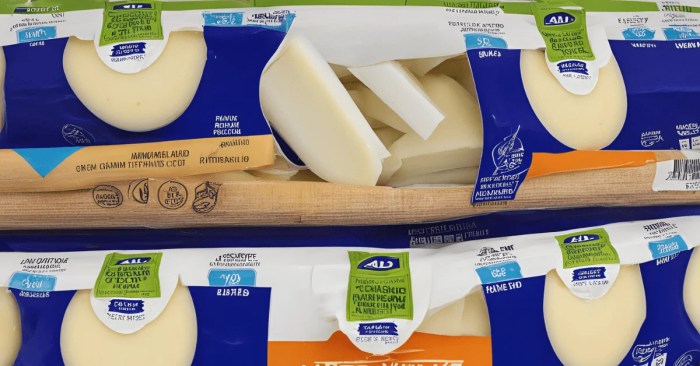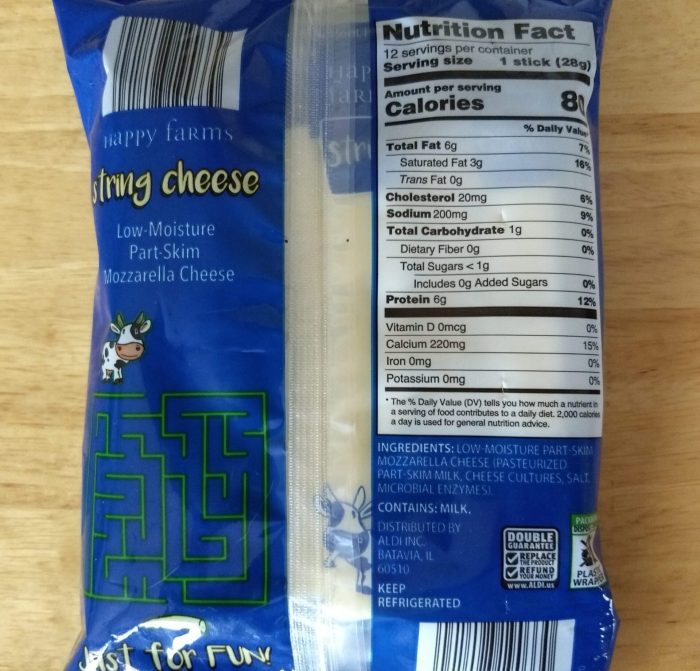Ingredients and Allergens: Aldi String Cheese Nutrition

Aldi string cheese nutrition – Understanding the ingredients in your Aldi string cheese is crucial for making informed choices about your diet and managing potential allergies. Knowing what’s in your food empowers you to take control of your health and well-being. Let’s delve into the specifics.
Aldi string cheese offers a convenient, portable protein source, but its nutritional profile should be carefully considered. For a comparative analysis of dairy products, examining the detailed nutrition facts on cottage cheese provides valuable context. Ultimately, the best choice between Aldi string cheese and cottage cheese depends on individual dietary needs and preferences, so always check the specific nutritional information for your chosen product.
Aldi string cheese, like most varieties, typically contains a relatively simple list of ingredients. However, even these seemingly simple ingredients can have significant impacts on both nutritional value and the risk of allergic reactions. It’s vital to carefully review the ingredient list on each specific package, as formulations can vary slightly.
Typical Ingredients and Their Nutritional Impact
The following is a list of ingredients commonly found in Aldi string cheese. Remember that specific ingredients and their order may vary depending on the specific product and flavor.
- Pasteurized Milk: This is the primary ingredient, providing protein, calcium, and other essential nutrients. The fat content will influence the overall calorie and fat content of the cheese.
- Cheese Culture: These bacteria are essential for the cheese-making process, contributing to flavor and texture. They are generally not considered allergens.
- Salt: Adds flavor and acts as a preservative. Excessive salt intake can contribute to high blood pressure, so moderation is key.
- Enzymes: These help in the cheese-making process and are generally not considered allergens. Their role is to aid in coagulation and ripening.
- Optional Ingredients (depending on flavor): These could include things like annatto (for color), natural flavorings, or other spices. Always check the label for specifics.
Common Allergens in String Cheese and Label Identification
The most common allergen found in Aldi string cheese, and string cheese in general, is milk. Milk is a major allergen for many people, causing reactions ranging from mild discomfort to severe anaphylaxis. Always carefully check the label for any indication of milk or milk derivatives. Look for words like “whey,” “casein,” “milk solids,” or “lactose,” as these are all milk-related components.
While less common, some string cheese varieties may contain other allergens, such as soy (in some natural flavorings) or tree nuts (in certain flavored varieties). Always carefully read the entire ingredient list and the allergen statement on the product label. The allergen statement is usually clearly marked and will list all major allergens present in the product.
If you have any food allergies or sensitivities, it’s crucial to carefully examine the label before consuming any food product, including Aldi string cheese.
Remember: When in doubt, always consult with your doctor or a registered dietitian if you have any concerns about ingredients or potential allergens in your food.
Nutritional Comparison to Other Dairy Products

Let’s elevate our understanding of Aldi string cheese by comparing its nutritional profile to other popular dairy choices. Making informed decisions about what fuels our bodies is a crucial step towards a healthier lifestyle. This comparison will empower you to choose the dairy option that best aligns with your individual nutritional goals.Aldi string cheese offers a convenient and portable source of protein and calcium, but how does it stack up against other dairy staples like milk, yogurt, and cheese slices?
Understanding these differences will allow you to make conscious choices that support your overall well-being.
Nutritional Comparison Table
The following table provides a general comparison of the nutritional content of Aldi string cheese (per serving) to other common dairy products. Remember that specific nutritional values can vary depending on the brand, fat content, and serving size. Always check the nutrition label on the specific product you are consuming.
| Nutrient | Aldi String Cheese (approx.) | Milk (1 cup) | Yogurt (1 cup) | Cheese Slices (2 slices) |
|---|---|---|---|---|
| Calories | 70-80 | 100-150 | 100-150 | 70-100 |
| Protein (grams) | 6-7 | 8-9 | 10-15 | 6-8 |
| Fat (grams) | 5-7 | 2-8 | 0-10 | 5-10 |
| Calcium (mg) | 150-200 | 300 | 300-450 | 200-300 |
| Sodium (mg) | 100-150 | 100-120 | 50-150 | 150-250 |
Advantages and Disadvantages of Aldi String Cheese
Choosing between different dairy snacks involves weighing the pros and cons. Aldi string cheese, for instance, offers portability and convenience, making it an ideal on-the-go snack. However, compared to yogurt, it might be lower in certain vitamins and probiotics. Similarly, while it offers comparable protein to cheese slices, it might contain higher sodium levels depending on the specific product.
The key is to make a choice that best suits your dietary needs and preferences.
Nutritional Differences in Aldi String Cheese Varieties, Aldi string cheese nutrition
Aldi, like many other brands, offers string cheese in various fat content options: full-fat, low-fat, and reduced-fat. These variations significantly impact the nutritional profile. Understanding these differences allows for a more tailored selection based on individual dietary requirements.
| Nutrient | Full-Fat | Low-Fat | Reduced-Fat |
|---|---|---|---|
| Calories | Higher | Moderate | Lower |
| Fat (grams) | Higher | Lower | Lowest |
| Saturated Fat (grams) | Higher | Lower | Lowest |
| Protein (grams) | Similar | Similar | Similar |
| Calcium (mg) | Similar | Similar | Similar |
FAQ Insights
Is Aldi string cheese a good source of calcium?
Yes, like most cheeses, Aldi string cheese provides a decent amount of calcium, contributing to bone health.
Does Aldi string cheese contain lactose?
Most Aldi string cheese varieties contain lactose, so it’s not suitable for those with lactose intolerance. Check the label for specific information.
How long can I keep Aldi string cheese after opening?
Once opened, consume Aldi string cheese within a few days and refrigerate properly to maintain freshness and prevent spoilage.
Are there any gluten-free options of Aldi string cheese?
Generally, Aldi string cheese is naturally gluten-free, but always double-check the ingredient list to ensure there are no added gluten-containing ingredients.

